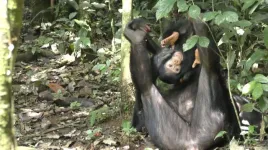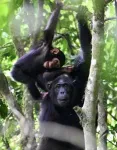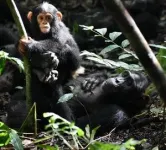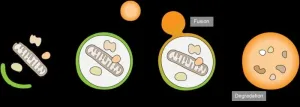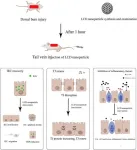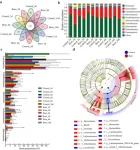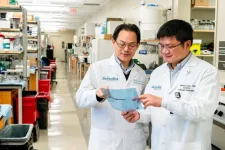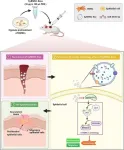(Press-News.org) When it comes to nurturing their young, mother chimpanzees go the extra mile, according to a new study. Using 10 years of observational data on wild chimpanzees, researchers found that while adults often play, and young chimps play a lot, when food gets scarce, the adults put mutual play aside and focus on survival.
But in the meantime, mother chimps continue to be their offspring’s primary playmate, tickling, chasing, playing ‘airplane’. That suggests the mother chimps take on an indispensable role fostering their young’s physical and social development even when they are under food stress.
The study observations took place in Kibale National Park in Uganda, and the study analysis, published in Current Biology, was led by Zarin Machanda, an assistant professor of anthropology and biology, and her former postdoctoral associate Kris Sabbi, who is currently a college fellow in human evolutionary biology at Harvard University.
Kibale is the most primate-dense forest in the world, with thirteen species living there including over 1,000 chimpanzees. Researchers started habituating the chimps to the presence of humans in 1987. Over the decades, teams of researchers took detailed field notes of almost every observable behavior— including climbing, feeding, grooming, calling, aggression, and play.
Through their previous work, Machanda and Sabbi were familiar with the playfulness of chimpanzees and decided to look deeper into the patterns of play behavior. They expected seasonal variations in food availability would affect adult chimps’ time spent playing.
For example, when supplies of quality fruits were low, the chimps focused on finding and gathering figs and leaves, and put play time aside. Surprisingly, although chimp mothers had the same challenge in finding food, they continued devoting a lot of their time to nurturing their offspring’s development through play.
Learning Lessons from Play
“The research on play ties into an effort to understand the evolution of leadership among chimps,” said Machanda. “We were trying to see whether chimps have only one pathway to leadership, which has always been assumed to be aggressiveness, or whether play and other behaviors build multiple dimensions of character that might make them more or less successful.”
Play is not very common in the wild, at least among adult animals. Young mammals do play often, but mostly with each other, or at the expense of an exasperated and passive adult. Exceptions include dolphins, monkeys, and apes. Natural selection tends to suppress the costly exercise after it serves its purpose for development, and time comes to focus on finding food, watching out for predators, and mating. With chimps, however, adult play serves to cement social bonds.
Why do some primates play throughout life and other mammals don’t? “I think what sets primates apart is that they spend more time growing up compared to other mammals,” said Machanda. “They also have highly developed brains and live in structured groups, with very specific rules governing interactions between individuals. Play permits them to build not only physical skills, but also the skills of social interaction.”
Social structure in the chimpanzee world may also explain why mother chimps sometimes become the primary play partners for their young. The chimpanzees have a very fluid social system called fission-fusion, which means a group of 60 chimps, for example, may have smaller groups break away for days or weeks, which then merge again while other groups break off.
When food becomes scarce, chimp mothers tend to break away into smaller groups or solo with their babies. “But when they’re doing that, they are also limiting the ability of their young ones to play with others, and the moms become the primary playmates,” said Sabbi. “They’re trading off that lower feeding competition in the larger group for more time and energy being spent playing with their little ones.”
By comparison, a troop of 60 baboons always sticks together, so baby baboons always have other baboons close to their age nearby to play with. Baboon mothers usually do not play with their babies.
Types of Play
Play among the chimps often divides depending on their sex. “It’s not uncommon to see male chimps to engage in more aggressive types of play, while females are doing a type of play related to parenting,” said Machanda. “You see them practice carrying things—a kind of preparation for future maternal behavior. Males often size each other up, and when they hit their second birthday, play style changes and can get rougher.”
Mothers are often the ones that juveniles and older infants come back to. “If they’re playing with somebody and it starts to get a little bit too rough, they’ll switch it up and go back to playing with mom, because at the end of the day it’s a very safe place,” said Sabbi.
“If we compare to humans, it’s very easy to find lots of evidence in the child psychology literature for how important it is for human mothers and fathers to be playing with their children, especially at really young ages. Moms and dads are important first play partners before kids branch out into their own social networks,” she said.
“As a mom, it’s impossible to watch my kids and not see them as primates,” said Machanda. “I can see the incredible value of play in the lives of my own kids, when I’m playing with them or when I’m seeing them play with their friends. I can see how they’re using it to develop certain skills. I can also relate to the chimp moms and the energy cost of play when their kids are jumping on them, and they just want to take a nap. But watching the chimps has made me a better parent.”
END
New study - chimp moms play with their offspring through good times and bad
Ten years of observational data suggest that the persistence of mother-child play is important for chimp development
2024-03-14
ELSE PRESS RELEASES FROM THIS DATE:
Tissue samples show the deep genetic and cellular impacts of smoking
2024-03-14
It’s no secret that smoking is extremely detrimental to health. Tobacco smoke contains thousands of chemicals, including carcinogens, increasing the risk of cancer, cardiovascular and respiratory diseases.
A new study from the University of Chicago analyzed data from more than 900 samples of nine different human tissue types to understand just how deep the cellular and genetic damage from smoking goes. The research team generated epigenetic data to assess the effects of smoking on DNA methylation, or genetic locations where a handful ...
SickKids program provides integrated, trauma-informed care for pregnant and parenting adolescents
2024-03-14
The pregnancy and post-partum experience is stressful, but for pregnant adolescents the barriers to accessing supportive care can have fatal consequences.
A recent study from The Hospital for Sick Children (SickKids) identified that compared with those who had no teen pregnancy, teenagers in Ontario who experienced a pregnancy were at a 50 per cent higher risk of premature death before the age of 31. This risk was even higher for people who had two or more teen pregnancies and amongst those who were pregnant before 16 years of age.
Published in JAMA Network Open, the study also found that ...
Even cells know the importance of recycling
2024-03-14
Researchers from Tokyo Medical and Dental University (TMDU) uncover the specific protein interactions needed for cells to break down and remove damaged mitochondria
Tokyo, Japan – Autophagy is a process used by cells as a recycling system to transport and break down organelles and other cytosolic components, which become enveloped in a membrane called the autophagosome (Fig 1). When this involves the removal of damaged mitochondria, commonly called the “powerhouse” of the cell, it is known as mitophagy. In a recent article ...
Political theorist Achille Mbembe named 2024 Holberg Prize Laureate
2024-03-14
Achille Mbembe is research professor of history and politics at the Wits Institute for Social and Economic Research, at the University of the Witwatersrand, Johannesburg. He will receive the award of NOK 6,000,000 (approx. EUR 525,000) during a 6 June ceremony at the University of Bergen, Norway.
Mbembe is one of the most read and cited scholars from the African continent and receives the prize for his pioneering research in African history, postcolonial studies, humanities, and social science over four decades. ...
Revolutionary nanoparticle therapy offers new hope for burn victims
2024-03-14
A research has developed a new nanoparticle treatment that significantly improves outcomes for severe burn-induced intestinal barrier disruption. The study introduces Luminol-conjugated cyclodextrin (LCD) nanoparticles, offering a promising therapeutic intervention for one of the most critical complications following severe burn injuries.
Severe burns can cause critical issues, including deep tissue damage and increased risk of fatal conditions like sepsis and organ failure. A major concern is the disruption of the intestinal barrier, leading to inflammation and systemic ...
New study unveiled burn injury disrupts gut microbiome and weakens intestinal mucus barrier
2024-03-14
The gut microbiota, a complex ecosystem within the human intestinal tract, is increasingly recognized for its vital role in human health and disease. Notably, its relationship with intestinal damage due to burns has been underexplored. New study has unveiled the pivotal role of gut microbiota in the synthesis and degradation of intestinal mucus following burn injuries in mice. Utilizing advanced 16S rRNA and metagenomic sequencing techniques, researchers have identified significant changes in gut microbiota composition and its impact on the intestinal mucus barrier.
On a study ...
Researchers may have found key to deprogram cells that lead to transplant rejection
2024-03-14
HOUSTON-(Mar. 14, 2024) – Houston Methodist researchers identified a troublesome subset of T-cells in transplant recipients that may be a more effective therapeutic target for preventing transplant rejection in patients.
Each day, 17 people die waiting for organ transplants, but getting a new organ doesn’t guarantee survival. Despite immunosuppressive medications, rejection of transplanted organs happens in up to 50% of patients, depending on the type of organ transplanted and the duration since the transplantation.
Wenhao Chen, Ph.D., associate professor of transplant immunology with the Houston Methodist Research ...
Healing diabetes wounds with a new superhero: stem cell magic
2024-03-14
Researchers unveiled a novel therapy for diabetic wound healing. This research highlights the use of exosomal miR-4645-5p from hypoxic bone marrow mesenchymal stem cells (BMSCs) to significantly enhance wound healing by promoting keratinocyte autophagy.
Diabetic wounds, often challenging to treat and prone to complications, can severely impact patients' quality of life. Traditional treatments have struggled with issues like low survival rates of transplanted cells and potential for immune rejection. This research introduces a groundbreaking approach using stem cells' regenerative capabilities.
On ...
New AI model detects ninety percent of lymphatic cancer cases
2024-03-14
Medical image analysis using AI has developed rapidly in recent years. Now, one of the largest studies to date has been carried out using AI-assisted image analysis of lymphoma, cancer of the lymphatic system. Researchers at Chalmers University of Technology in Sweden, have developed a computer model that can successfully find signs of lymph node cancer in 90 percent of cases.
New computer-aided methods for interpreting medical images are being developed for various medical conditions. They can reduce the workload for radiologists, by giving a second opinion or ranking which patients need treatment the fastest.
"An AI-based computer system for interpreting medical images ...
Bariatric surgery linked to heart health improvements in people with severe obesity
2024-03-14
WASHINGTON—Bariatric surgery may result in significant cardiometabolic improvements, particularly among younger, female, or white people and those without comorbidities, according to new research published in the Journal of the Endocrine Society.
The United States has the highest obesity rates globally. In 2017-2018, about 40% of U.S. adults had obesity and 9% had severe obesity. The prevalence is particularly high among Black adults. Bariatric surgery is one method to help people with severe obesity lose a lot of weight and improve their health.
“Our study highlights how bariatric surgery not only leads to significant weight loss but also substantially improves ...
LAST 30 PRESS RELEASES:
Tokyo Bay’s night lights reveal hidden boundaries between species
As worms and jellyfish wriggle, new AI tools track their neurons
ATG14 identified as a central guardian against liver injury and fibrosis
Research identifies blind spots in AI medical triage
$9M for exploring the fundamental limits of entangled quantum sensor networks
Study shows marine plastic pollution alters octopus predator-prey encounters
Night lights can structure ecosystems
A parasitic origin for the ribosome?
A gold-standard survey of the American mood
Tool for identifying children at risk of speech disorders
How Japanese medical trainees view artificial intelligence in medicine
MambaAlign fusion framework for detecting defects missed by inspection systems
Children born with upper limb difference show the incredible adaptability of the young brain
How bacteria can reclaim lost energy, nutrients, and clean water from wastewater
Fast-paced lives demand faster vision: ecology shapes how “quickly” animals see time
Global warming and heat stress risk close in on the Tour de France
New technology reveals hidden DNA scaffolding built before life ‘switches on’
New study reveals early healthy eating shapes lifelong brain health
Trashing cancer’s ‘undruggable’ proteins
Industrial research labs were invented in Europe but made the U.S. a tech superpower
Enzymes work as Maxwell's demon by using memory stored as motion
Methane’s missing emissions: The underestimated impact of small sources
Beating cancer by eating cancer
How sleep disruption impairs social memory: Oxytocin circuits reveal mechanisms and therapeutic opportunities
Natural compound from pomegranate leaves disrupts disease-causing amyloid
A depression treatment that once took eight weeks may work just as well in one
New study calls for personalized, tiered approach to postpartum care
The hidden breath of cities: Why we need to look closer at public fountains
Rewetting peatlands could unlock more effective carbon removal using biochar
Microplastics discovered in prostate tumors
[Press-News.org] New study - chimp moms play with their offspring through good times and badTen years of observational data suggest that the persistence of mother-child play is important for chimp development
